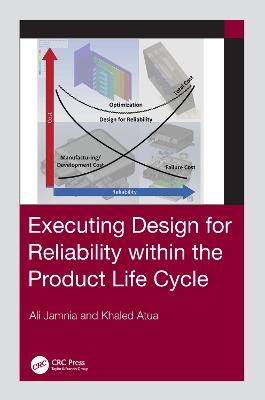
Executing Design for Reliability Within the Product Life Cycle
Crc Press Inc (Verlag)
978-0-8153-4897-9 (ISBN)
At an early stage of the development, the design teams should ask questions such as, "How reliable will my product be?" "How reliable should my product be?" And, "How frequently does the product need to be repaired / maintained?" To answer these questions, the design team needs to develop an understanding of how and why their products fails; then, make only those changes to improve reliability while remaining within cost budget.
The body of available literature may be separated into three distinct categories: "theory" of reliability and its associated calculations; reliability analysis of test or field data – provided the data is well behaved; and, finally, establishing and managing organizational reliability activities. The problem remains that when design engineers face the question of design for reliability, they are often at a loss. What is missing in the reliability literature is a set of practical steps without the need to turn to heavy statistics.
Executing Design for Reliability Within the Product Life Cycle provides a basic approach to conducting reliability-related streamlined engineering activities, balancing analysis with a high-level view of reliability within product design and development. This approach empowers design engineers with a practical understanding of reliability and its role in the design process, and helps design team members assigned to reliability roles and responsibilities to understand how to deploy and utilize reliability tools. The authors draw on their experience to show how these tools and processes are integrated within the design and development cycle to assure reliability, and also to verify and demonstrate this reliability to colleagues and customers.
Dr. Ali Jamnia is an electro-mechanical design and product development engineer, who received his PhD from Clemson University, where his primary area of research was application of finite element methods to the hydrodynamic equations in the presence of shock waves and nonlinear fluid-solid interaction. He has extensive experience in innovative product development from concept to market, as well as sustaining product experience; and expertise in analytical product design, and in failure analysis and resolution, using DMAIC. Dr. Jamnia joined Baxter Healthcare in 2010, where he holds the position of Engineering Specialist. In short, Dr. Jamnia is a mechanical engineer with many years of innovative product development from concept to market, as well as sustaining product experience. He has expertise in analytical product design as well as failure analysis and resolution using DMAIC. In this regard, he has an in-depth understanding of transfer functions and their development. Dr. Khaled Atua is a reliability expert with experience in electromechanical devices, and in ship design and construction. His experience covers areas such as medical devices, ship structural design, and mechanical engineering. He received his PhD from the University of Maryland, College Park, in 1998, where his primary area of research was Reliability-based Structural Design of Ships. Dr. Atua has published 22 technical papers and presentations, and his work has been cited and referenced in "Ship Design and Construction", from the Society of Naval Architects and Marine Engineers (SNAME). He has been a lecturer for Alexandria University (Egypt), The American University in Cairo, and the Arab Maritime & Transport Academy in Alexandria. He has also worked as the reliability manager and head of reliability for multiple US companies and corporations such Hospira Inc., Baxter International, and Beckman Coulter Inc.
List of Figures
Preface
Authors
1. Reliability, Risk, and Their Significance
2. Design for Reliability Process
3. The Design Process and the V-Model
4. Reliability Requirements, Modeling, and Allocation
5. Reliability Planning
6. Reliability Statistics
7. Predictive and Analytical Tools in Design
8. Component and Subsystem Reliability Testing
9. System Reliability Testing
10. Reliability Outputs
11. Sustaining Product Reliability
12. A Primer on Product Risk Management
13. Relating Product Reliability to Risk
Appendix
References
Index
| Erscheinungsdatum | 04.12.2019 |
|---|---|
| Zusatzinfo | 75 Tables, black and white; 115 Line drawings, black and white; 4 Halftones, black and white; 119 Illustrations, black and white |
| Verlagsort | Bosa Roca |
| Sprache | englisch |
| Maße | 178 x 254 mm |
| Gewicht | 821 g |
| Themenwelt | Technik ► Umwelttechnik / Biotechnologie |
| Wirtschaft ► Betriebswirtschaft / Management ► Logistik / Produktion | |
| ISBN-10 | 0-8153-4897-5 / 0815348975 |
| ISBN-13 | 978-0-8153-4897-9 / 9780815348979 |
| Zustand | Neuware |
| Informationen gemäß Produktsicherheitsverordnung (GPSR) | |
| Haben Sie eine Frage zum Produkt? |
aus dem Bereich


